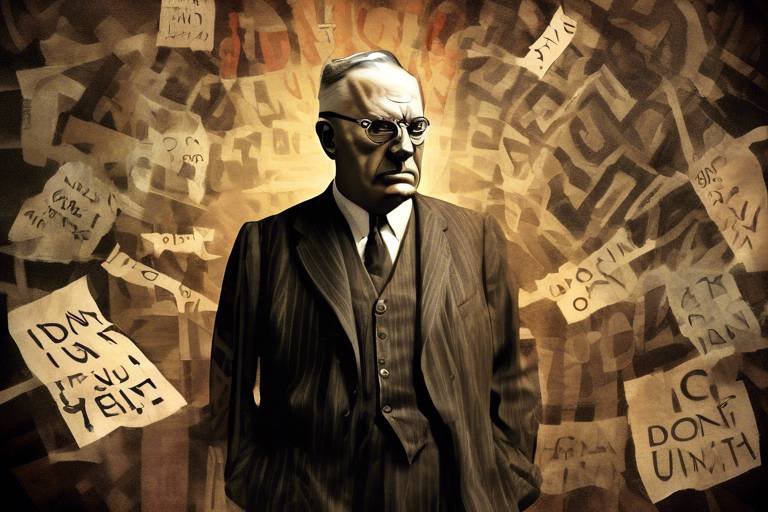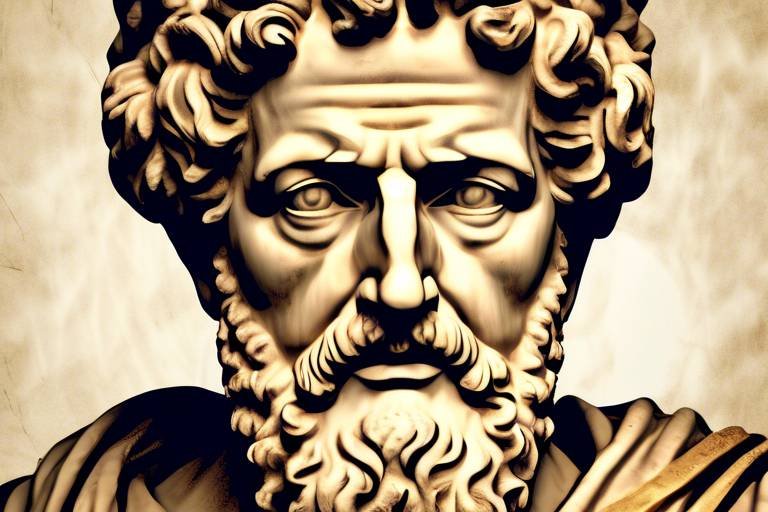The Concept of Time in Augustine's Confessions
In the realm of philosophical discourse, few subjects are as profound and perplexing as the concept of time. Augustine of Hippo, in his seminal work, Confessions, offers a unique lens through which we can explore this elusive phenomenon. His reflections not only challenge our conventional understanding of time but also invite us to reconsider our existence, memory, and relationship with the divine. Imagine time as a river—ever flowing, yet we often find ourselves stuck on the banks, contemplating its passage. Augustine's insights help us navigate these waters, shedding light on how we perceive the past, present, and future, and how these perceptions shape our identity and spirituality.
Augustine's exploration of time is deeply intertwined with his theological beliefs. He posits that time is not merely a sequence of events but a complex interplay of human consciousness and divine presence. In doing so, he encourages us to reflect on our own lives: How do we measure our days? Are we merely counting hours, or are we engaging with the moments that truly matter? Through his philosophical inquiries, Augustine compels us to examine our relationship with time, urging us to recognize its significance in our journey towards understanding ourselves and our place in the universe.
As we delve deeper into Augustine's thoughts, we find that he categorizes time into three distinct dimensions: the past, the present, and the future. Each of these dimensions plays a crucial role in shaping human experience. The past, for instance, is not just a collection of memories; it serves as a foundation for our identity. The present, however, is where life truly unfolds—fleeting and ephemeral, it demands our attention and awareness. Finally, the future embodies our hopes and aspirations, often tinged with uncertainty. By examining these dimensions, Augustine offers a framework that helps us understand how we relate to time and, ultimately, to God.
In summary, Augustine's Confessions invites us to embark on a journey through time, exploring its implications on our existence and spirituality. Through his reflections, we are encouraged to embrace the present, cherish our memories, and cultivate a hopeful outlook towards the future. In a world that often feels chaotic and fast-paced, Augustine's insights serve as a reminder to pause, reflect, and engage with the profound nature of time.
- What is Augustine's main argument about time in his Confessions?
Augustine argues that time is a complex interplay of human consciousness and divine presence, challenging conventional notions of past, present, and future. - How does Augustine view the present moment?
He sees the present as fleeting and significant, emphasizing its role in human consciousness and spiritual awareness. - What role does memory play in Augustine's understanding of time?
Memory shapes our understanding of the past and serves as a tool for personal identity and spiritual growth. - How does Augustine contrast temporal time with God's eternal nature?
He reflects on how understanding eternity can transform our perception of time and our existence within it.

Augustine's Definition of Time
Augustine offers a unique perspective on time, challenging conventional notions that often compartmentalize our understanding into rigid categories. In his Confessions, he introduces a thought-provoking framework that invites us to reconsider how we perceive the past, present, and future. Rather than viewing these temporal dimensions as separate entities, Augustine argues that they are interconnected, each playing a crucial role in shaping our human experience and memory.
To Augustine, the past is not merely a collection of moments that have slipped away; it is a rich tapestry woven from our experiences, memories, and lessons learned. He posits that the past exists in our minds, allowing us to reflect on our choices and understand our identities. In contrast, the future is often seen as a realm filled with uncertainty and potential. Augustine emphasizes that while we can anticipate what is to come, the future remains elusive, always just out of reach. This duality between the past and future is bridged by the present, which he describes as the only moment we can truly experience. It is in the present that we connect with our memories and project our hopes, making it a pivotal point in our spiritual journey.
In his reflections, Augustine also highlights the significance of memory as a dynamic force in our lives. He sees memory as more than just a storage space for past events; it is a vital part of our identity and a tool for spiritual growth. Through memory, we engage with our past, allowing it to inform our present actions and future aspirations. This cyclical relationship between time and memory underscores the idea that our understanding of time is not just a philosophical exercise but a deeply personal and spiritual endeavor.
Augustine further distinguishes between subjective time—how we perceive and experience time—and objective time, which is measured by clocks and calendars. He argues that while objective time is a necessary construct for organizing our lives, subjective time is where we truly live, feel, and connect with the divine. This distinction opens up a fascinating dialogue about how our perceptions shape our reality and how we can find meaning in the fleeting moments of our lives.
In summary, Augustine's definition of time transcends mere chronology. It invites us to explore the intricate relationship between our experiences, memories, and the divine. By understanding time through Augustine's lens, we can appreciate the profound impact it has on our existence, urging us to live fully in the present while remaining mindful of our past and hopeful for our future.

The Nature of the Present
In his monumental work, Confessions, Augustine immerses himself in the essence of the present moment, revealing its profound significance. He argues that the present is not merely a fleeting point in time but an essential aspect of human consciousness. Think about it: every decision we make, every emotion we feel, and every experience we encounter happens in the present. It’s like standing on a tightrope, balancing between the past and the future, where the present moment is the only solid ground we have.
Augustine posits that the present is a dynamic and ever-changing reality. It’s as if time is a river, constantly flowing, and we are but travelers navigating its currents. This idea prompts us to consider how we engage with our current experiences. Are we fully present, or are we often lost in the echoes of what has been or the shadows of what is yet to come? He emphasizes that our awareness of the present is crucial for spiritual growth and self-awareness, making it a cornerstone of our existence.
Furthermore, Augustine suggests that the present moment serves as a bridge between our memories of the past and our hopes for the future. He intriguingly notes that while the past is fixed and the future is uncertain, the present is where we hold the power to act. This is where our choices are made, where we can seek to align our lives with divine will. It’s a point of intersection, a sacred space where we can connect with God and our true selves.
To illustrate this, consider the following table that summarizes Augustine's views on the different dimensions of time:
| Dimension of Time | Characteristics | Significance |
|---|---|---|
| Past | Fixed, unchangeable | Source of memory and identity |
| Present | Fleeting, dynamic | Site of action and spiritual awareness |
| Future | Uncertain, hopeful | Realm of anticipation and potential |
In this context, Augustine challenges us to embrace the present fully. He argues that our spiritual journey requires us to be attentive to the here and now. It’s easy to get caught up in regrets about the past or anxieties about the future, but true spiritual awakening happens in the present. This is where we can experience God’s grace and love, and where we can make choices that reflect our faith.
Ultimately, Augustine's reflections on the nature of the present invite us to consider how we live our lives. Are we present in our relationships, in our prayers, and in our everyday actions? By cultivating an awareness of the present moment, we can deepen our connection to ourselves, to others, and to the divine. The present is not just a point in time; it is a vibrant, living experience that shapes our existence.
- Why is the present moment important in Augustine's philosophy? The present is where we can act, make choices, and connect with God, making it crucial for spiritual growth.
- How does Augustine view the relationship between the past, present, and future? He sees them as interconnected, with the present serving as a bridge between the fixed past and the uncertain future.
- What can we learn from Augustine about living in the present? We can learn to embrace the present fully, allowing it to guide our actions and deepen our spiritual awareness.

The Past and Memory
Augustine's exploration of the past is intricately tied to the concept of memory, which he views as a vital component of human identity and spiritual development. For Augustine, memory is not merely a repository of past events but a dynamic landscape where experiences are revisited, reinterpreted, and integrated into our understanding of self. He famously states that the past exists only in our memory, suggesting that without memory, the past would cease to have any significance. This perspective challenges us to consider how our recollections shape our present realities and future aspirations.
In his Confessions, Augustine reflects on the subjective nature of memory, emphasizing that it can be both a source of profound insight and a potential barrier to spiritual growth. He argues that memory allows us to connect with our past, providing a framework through which we can understand our current state of being. However, this connection is not always straightforward. Memories can be distorted, selective, or even forgotten, leading to a fragmented sense of identity. Augustine suggests that our relationship with memory is complex; it can illuminate truths about our existence while simultaneously obscuring them.
One of the most striking aspects of Augustine's view on memory is its relationship with God's eternal nature. He posits that memory serves as a bridge between our temporal existence and the eternal truths of God. In this sense, memory becomes a tool for spiritual growth, allowing individuals to reflect on their experiences and draw closer to the divine. Augustine encourages us to engage with our memories actively, to sift through them for lessons and insights that can inform our spiritual journey. He believes that by understanding our past, we can better comprehend our present and anticipate our future.
However, Augustine does not shy away from discussing the darker side of memory. He acknowledges that forgetting can hinder our spiritual journey. When we forget our experiences, particularly those that reveal God's grace or our own shortcomings, we risk losing touch with essential truths that guide our lives. This idea raises an important question: what happens when we forget the lessons of our past? Augustine warns that such forgetfulness can lead to a disconnection from our spiritual roots, making it challenging to navigate our relationship with God and ourselves.
In summary, Augustine's reflections on the past and memory invite us to engage deeply with our own experiences. He challenges us to view memory not just as a passive recall of events but as an active, transformative force in our lives. By embracing our memories, both good and bad, we can cultivate a richer understanding of ourselves and our relationship with the divine. This journey through memory is not merely an intellectual exercise; it is a profound spiritual practice that can lead to greater awareness, deeper faith, and ultimately, a more meaningful existence.
- What is Augustine's main idea about memory? Augustine believes that memory is essential for understanding our identity and our relationship with God, acting as a bridge between our past experiences and eternal truths.
- How does forgetting impact our spiritual journey? Forgetting can hinder our connection to divine truths and lessons learned from past experiences, making it difficult to grow spiritually.
- Why is the past important in Augustine's philosophy? The past shapes our present identity and influences our future, making it crucial for personal growth and spiritual awareness.

Memory as a Source of Truth
In Augustine's Confessions, memory emerges as a profound and intricate mechanism that not only shapes our understanding of the past but also serves as a vital link to the divine. Augustine posits that memory is not merely a repository of past events; rather, it acts as a bridge connecting our temporal experiences with the eternal nature of God. Imagine memory as a vast library where each book represents a moment in time, filled with lessons, emotions, and divine encounters. This library, however, is not just for recalling facts; it is a space where we can engage with the truths of our existence and our relationship with the divine.
Augustine argues that through memory, we can access the truths of our experiences. When we reflect on our past, we are not just reminiscing; we are uncovering layers of meaning that inform our current identity and spiritual journey. For instance, recalling a moment of grace or a significant encounter can illuminate our understanding of God's presence in our lives. This process is akin to peeling an onion—each layer reveals deeper insights and connections that enhance our spiritual awareness.
Moreover, Augustine emphasizes that memory plays a crucial role in our personal identity. Our memories define who we are, shaping our beliefs, values, and aspirations. They are the threads that weave together the tapestry of our lives. As we navigate through various experiences, our memories act like a compass, guiding us in our quest for truth and understanding. This notion invites us to consider: how often do we reflect on our memories to uncover the divine truths they hold?
However, Augustine does not shy away from addressing the limitations of memory. He acknowledges that our recollections can be flawed, distorted by time and emotion. Forgetting, in this context, can serve as both a blessing and a curse. While it can liberate us from painful memories, it can also hinder our spiritual growth by obscuring the lessons learned from past experiences. This duality raises an important question: how can we cultivate a healthy relationship with our memories to ensure they serve as a source of truth rather than confusion?
In summary, Augustine's exploration of memory as a source of truth invites us to engage deeply with our past. By doing so, we can uncover the layers of meaning that inform our present and guide us toward a more profound connection with the divine. As we reflect on our memories, we can find a pathway to understanding not just ourselves, but also the eternal truths that shape our existence.
- What is the significance of memory in Augustine's philosophy?
Augustine views memory as a crucial mechanism that connects human experience with divine truth, allowing individuals to reflect on their past and understand their identity. - How does Augustine differentiate between memory and forgetting?
Augustine acknowledges that while memory can reveal important truths, forgetting can sometimes hinder spiritual growth by obscuring valuable lessons from past experiences. - Can memory be considered reliable according to Augustine?
Augustine recognizes that memory can be flawed and influenced by emotions, which means it must be approached with caution when seeking truth.

The Role of Forgetting
For Augustine, forgetting is not merely a passive act; it plays a crucial role in our spiritual journey and relationship with God. It's fascinating to consider how forgetting can sometimes serve as a protective mechanism, shielding us from the painful memories that might otherwise weigh us down. But what happens when we forget essential truths about ourselves and our connection to the divine? In his Confessions, Augustine emphasizes that forgetting can hinder our spiritual growth, creating a barrier between us and the eternal truths that God embodies.
He argues that our memories are like a tapestry, woven from the threads of our experiences, emotions, and encounters with the divine. When we forget, we risk losing pieces of this tapestry, which can lead to a fragmented sense of self. Augustine suggests that this fragmentation can prevent us from fully engaging with our spiritual identities. After all, how can we understand who we are if we forget the moments that shaped us?
Moreover, Augustine highlights that forgetting can lead to a disconnection from God. If we forget the lessons learned from our past failures and triumphs, we may find ourselves repeating the same mistakes, wandering further away from divine grace. This cyclical nature of forgetting and repeating underscores the importance of memory in our spiritual lives. In essence, memory serves as a bridge between our temporal existence and the eternal nature of God.
But forgetting isn't entirely negative. Augustine acknowledges that it can offer a sort of liberation. By letting go of certain burdensome memories, we open ourselves to new experiences and growth. However, this selective forgetting must be approached with caution. It’s a balancing act—while we should strive to forget the pain that hinders us, we must also remember the lessons that guide us towards a deeper understanding of God and our purpose in life.
In conclusion, Augustine's reflections on forgetting compel us to ponder its dual nature. It can either serve as a hindrance to our spiritual journey or as a means of liberation. Ultimately, the challenge lies in discerning which memories to hold onto and which to release, as we navigate the complexities of our existence in pursuit of divine truth.
- What is the significance of memory in Augustine's philosophy? Memory is central to Augustine's understanding of identity and spiritual growth, serving as a link between our past experiences and our relationship with God.
- How does forgetting impact our relationship with God? Forgetting can hinder our spiritual journey by causing us to lose sight of essential truths and lessons learned, potentially leading to disconnection from the divine.
- Is forgetting always negative according to Augustine? Not necessarily. Augustine acknowledges that selective forgetting can provide liberation from burdensome memories, but it must be approached with caution.

Anticipation of the Future
When we think about the future, it's like staring into a foggy abyss, isn't it? Augustine dives deep into this notion of anticipation, suggesting that our outlook on what lies ahead is not just a simple exercise in wishful thinking. Instead, it plays a pivotal role in shaping our decisions and actions in the present. For Augustine, the future is a canvas of uncertainty and hope, where our dreams and fears intertwine, creating a complex tapestry of human experience.
He posits that anticipation is a driving force behind our choices. It’s that little voice in our heads that whispers, “What if?” and “I hope this works out.” This anticipation can inspire us to seek better outcomes, pushing us to strive for personal growth and spiritual enlightenment. Imagine standing at the edge of a cliff, peering into the vast expanse below; the thrill of potential and the fear of falling are both present, influencing our next move.
Augustine also emphasizes that this anticipation is inherently tied to our understanding of salvation. As we look forward, we are not just envisioning our personal futures but also contemplating our eternal destinies. This duality of time—where the future holds both temporal and eternal significance—invites us to reflect on how we live today. Are we making choices that align with our spiritual aspirations? Are we nurturing relationships that foster our growth? These questions echo in the corridors of our minds, urging us to act with intention.
Furthermore, the anticipation of the future can be a source of anxiety for many. The fear of the unknown can paralyze us, leading to inaction and despair. Augustine acknowledges this struggle, reminding us that while we cannot control the future, we can control our responses to it. By placing our trust in God, we can transform our apprehension into a hopeful expectation. This shift in perspective allows us to embrace the future with open arms, rather than retreating in fear.
In essence, Augustine’s reflections on the anticipation of the future encourage us to strike a balance between hope and caution. It’s about recognizing that while we cannot predict what lies ahead, we can prepare ourselves spiritually and emotionally. By fostering a relationship with the divine, we can find peace in the uncertainty, allowing our anticipation to guide us rather than hinder us.
- What does Augustine mean by anticipation of the future?
Augustine views anticipation as a significant aspect of human experience that influences our actions and spiritual journey. - How does anticipation affect our decision-making?
Anticipation can inspire us to make choices that align with our hopes and aspirations, pushing us towards personal and spiritual growth. - Can anticipation lead to anxiety?
Yes, the fear of the unknown can create anxiety, but Augustine encourages us to trust in God to transform that fear into hope. - What role does memory play in anticipation?
Memory helps us reflect on past experiences, shaping our expectations and hopes for the future.

Time and Eternity
Augustine's exploration of time and eternity is a profound aspect of his philosophical reflections in the *Confessions*. He navigates the complex relationship between the two, suggesting that while human beings are bound by the constraints of time, God exists outside of it. This notion can be quite mind-boggling, can't it? Imagine trying to grasp the idea of a being that is not limited by the ticking clock or the calendar. For Augustine, time is a creation of God, a means through which we experience our lives, whereas eternity is the divine reality that transcends our temporal existence.
Augustine articulates that our understanding of time is inherently flawed because it is intertwined with our human experience. We perceive time through a sequence of moments—past, present, and future—which can often feel like a relentless march forward. In contrast, God's eternity is a single, unchanging reality. To illustrate this, Augustine uses the analogy of a long, winding road that we travel. While we can see the path ahead and the memories of the path behind, God sees the entire road at once, unencumbered by our limited perspective.
In this light, Augustine emphasizes the importance of aligning our understanding of time with our spiritual journey. He posits that recognizing the fleeting nature of our existence can lead to a deeper appreciation for the eternal truths that God embodies. The theological implications of this understanding are significant. It allows believers to see their lives as part of a larger narrative, one that is woven into the fabric of eternity. This perspective can transform how we approach our daily lives, encouraging us to live with intention and purpose, aware that our actions have eternal significance.
Furthermore, Augustine's reflections invite us to consider the implications of time on our relationship with God. He suggests that our prayers, thoughts, and actions are not just momentary but are part of an eternal dialogue with the divine. This means that every moment spent in reflection or worship is not just a fleeting instance but a meaningful connection to eternity itself. It's a comforting thought, isn't it? Knowing that our struggles and joys are part of a larger divine plan, one that exists beyond our immediate understanding.
To summarize Augustine's views on time and eternity, we can highlight a few key points:
- Time is a created reality: It serves as the framework within which human experiences unfold.
- Eternity is God's nature: It represents a reality that is constant and unchanging.
- Our relationship with God: Understanding the distinction between time and eternity can enhance our spiritual awareness.
- Living with intention: Recognizing the significance of our actions in the context of eternity can motivate us to lead more purposeful lives.
In conclusion, Augustine's insights challenge us to rethink our relationship with time and eternity. By understanding that while we are bound by time, we are also invited into a relationship with the eternal God, we can find a profound sense of peace and purpose in our lives. This exploration not only deepens our faith but also encourages us to live in a way that reflects the eternal truths we hold dear.
What is the difference between time and eternity according to Augustine?
Augustine distinguishes time as a created reality that humans experience sequentially, while eternity is God's unchanging and timeless nature.
How does Augustine's view of time affect our spiritual lives?
By recognizing the fleeting nature of time, Augustine encourages believers to live intentionally, understanding that their actions have eternal significance.
Can we experience eternity in our daily lives?
Yes, Augustine suggests that through prayer and reflection, we can connect with the eternal, making our momentary experiences part of a larger divine narrative.

Theological Implications of Time
Augustine's exploration of time is not merely an academic exercise; it carries profound theological implications that resonate through centuries of thought. He proposes a stark contrast between the temporal nature of human existence and the eternal essence of God. This distinction is crucial because it shapes how we understand our place in the universe and our relationship with the divine.
For Augustine, time is a creation of God, designed to serve a purpose in the grand tapestry of existence. He argues that while humans are bound by time, God exists outside of it—timeless and unchanging. This leads to the question: if God is eternal, how does He interact with a world that is constantly in flux? Augustine suggests that God's relationship with time is fundamentally different from ours. While we perceive time as a linear progression, God sees all moments—past, present, and future—simultaneously. This understanding invites us to reconsider the nature of divine providence and the way God engages with humanity.
One of the key theological implications of Augustine's view on time is the concept of divine foreknowledge. If God exists outside of time, He is not limited by the constraints of temporal progression. This raises fascinating questions about free will: if God knows our choices before we make them, are we truly free? Augustine navigates this complex terrain by asserting that God's foreknowledge does not negate human free will. Instead, he posits that God's eternal perspective allows Him to see our choices without imposing His will upon us. This delicate balance between divine sovereignty and human agency becomes a cornerstone of Augustine's theological framework.
Furthermore, Augustine's reflections on time compel believers to consider the significance of redemption and salvation. He emphasizes that the past, while filled with sin and regret, can be redeemed through God's grace. This idea is liberating: it suggests that no matter how burdened we feel by our past actions, we can find hope in the eternal nature of God's love. The present moment, then, becomes a sacred opportunity for transformation and spiritual growth. By anchoring our faith in the eternal, we can navigate the challenges of temporal existence with a sense of purpose and direction.
Augustine's thoughts on time also offer a unique perspective on the afterlife. He contemplates how the eternal nature of God provides a glimpse into the reality of eternal life. This belief is not just a comforting notion but a profound truth that influences how we live our lives today. Augustine asserts that understanding our temporal existence in light of eternity can radically alter our priorities and choices. It invites us to live with a sense of urgency, recognizing that our time on earth is limited and should be spent in pursuit of what truly matters—our relationship with God and with others.
In summary, Augustine's theological implications of time invite us to engage deeply with our understanding of existence, free will, and the divine. His reflections challenge us to view our lives through the lens of eternity, encouraging a faith that transcends the fleeting moments of our daily experiences. This profound exploration of time not only enriches our spiritual journey but also empowers us to embrace the complexities of life with hope and purpose.
- What is Augustine's main argument about time? Augustine argues that time is a creation of God, contrasting it with God's eternal nature.
- How does Augustine reconcile free will with divine foreknowledge? He believes that God's eternal perspective allows Him to know our choices without infringing on our free will.
- What role does memory play in Augustine's understanding of time? Memory serves as a bridge between our temporal experiences and God's eternal truth, shaping our identity and spiritual growth.
- Why is the concept of eternity important in Augustine's theology? Understanding eternity transforms our perception of time and our priorities, encouraging us to live meaningfully in the present.

Philosophical Reflections on Time
Augustine's exploration of time is not just an intellectual exercise; it is a profound inquiry into the nature of existence itself. His reflections invite us to ponder questions that have lingered in the minds of thinkers for centuries: What is time? How do we experience it? And what does it mean for our lives and our souls? In his Confessions, Augustine presents time as a complex tapestry woven from the threads of memory, anticipation, and divine presence. He challenges us to consider that time is not merely a linear progression of moments but a rich interplay of the past, present, and future that shapes our identity and spirituality.
One of the most striking aspects of Augustine's philosophy is his assertion that the present is the only moment we truly possess. He argues that while the past is fixed in memory and the future remains uncertain, the present is where we experience life in its fullness. Yet, he also notes the paradox of the present: it is perpetually fleeting, slipping through our fingers like sand. This dynamic nature of the present compels us to be mindful of our existence, urging us to engage deeply with each moment. As Augustine eloquently states, "What is time? If no one asks me, I know what it is. If I wish to explain it to him who asks, I do not know." This quote encapsulates the essence of his philosophical struggle with time.
Moreover, Augustine's reflections extend to the relationship between time and eternity. He posits that while human beings are bound by temporal constraints, God exists outside of time, in an eternal now. This contrast raises profound theological implications. For Augustine, understanding God's eternal nature allows us to reframe our perception of time. It encourages us to view our temporal existence as a preparation for eternal communion with the divine. In this light, time becomes not just a measure of our days but a sacred journey towards a greater reality.
In contemplating time, Augustine also touches on the impact of our choices and actions. The way we navigate our temporal experience can either draw us closer to God or lead us astray. He suggests that living in awareness of our mortality can inspire us to seek a deeper relationship with the divine. By recognizing the transient nature of life, we are motivated to pursue what truly matters—love, faith, and spiritual growth. This perspective invites us to reflect on our daily lives, asking ourselves: Are we making choices that align with our ultimate purpose?
In essence, Augustine's philosophical reflections on time challenge us to engage with our existence on a deeper level. They invite us to consider not just how we measure time, but how we experience it—how our memories shape us, how our hopes guide us, and how our understanding of eternity transforms our lives. As we navigate the complexities of our temporal existence, Augustine's insights remind us that time is a gift, a precious opportunity to grow, learn, and ultimately connect with the divine.
- What is Augustine's main argument about time?
Augustine argues that time is a complex interplay of the past, present, and future, emphasizing the significance of the present moment in human experience. - How does Augustine differentiate between time and eternity?
He posits that while humans are bound by time, God exists outside of it, which transforms our understanding of existence and divine providence. - Why is memory important in Augustine's philosophy?
Memory shapes our identity and spiritual growth, serving as a bridge between our temporal experiences and God's eternal nature. - How can Augustine's views on time influence our daily lives?
His reflections encourage us to live mindfully, making choices that align with our spiritual growth and ultimate purpose.
Frequently Asked Questions
- What is Augustine's definition of time?
Augustine defines time as a complex interplay between the past, present, and future. He emphasizes that while the past is a collection of memories and the future is a realm of uncertainty, the present moment is where our consciousness truly exists. This unique perspective challenges conventional views and invites deeper reflection on how we perceive time in our lives.
- How does Augustine view the present moment?
In his Confessions, Augustine highlights the present as a fleeting yet significant aspect of human experience. He argues that our awareness of the present moment is crucial for spiritual growth and understanding. It's like trying to catch a wave—once you think you've grasped it, it's already passed, but that moment is where life truly happens.
- What role does memory play in Augustine's understanding of the past?
Memory, for Augustine, is not just a record of what has happened; it's a vital tool for shaping our identity and spiritual journey. He posits that through memory, we can connect with our past experiences and understand our relationship with God. It's as if memory serves as a bridge, linking our temporal existence to the eternal truths of divine reality.
- Why is forgetting significant in Augustine's philosophy?
Augustine addresses forgetting as a potential barrier in our spiritual journey. He suggests that when we forget important truths or experiences, we risk losing our connection to God and to our true selves. Forgetting can hinder personal growth and awareness, making it a crucial aspect to consider in our quest for understanding and faith.
- How does Augustine view the future?
For Augustine, the future embodies both uncertainty and hope. He reflects on how our anticipation of what is to come influences our actions and decisions in the present. This anticipation drives us toward salvation and shapes our spiritual aspirations, making the future a significant aspect of our existence.
- What is the relationship between time and eternity in Augustine's thought?
Augustine contrasts the fleeting nature of temporal time with the eternal nature of God. He argues that understanding eternity can profoundly alter our perception of time, encouraging us to see our lives within the broader context of divine providence. This perspective invites us to reflect on how our temporal experiences relate to the eternal truths of existence.
- What are the theological implications of Augustine's views on time?
Augustine's reflections on time carry significant theological implications, especially regarding God's relationship with time. Unlike humans, who experience time linearly, God exists outside of time, which shapes our understanding of divine providence and the nature of existence. This distinction encourages readers to contemplate their own lives in relation to the eternal.
- How do Augustine's philosophical inquiries invite personal reflection?
Augustine's philosophical explorations into time challenge readers to contemplate their own existence and how time influences their lives and faith. By reflecting on these themes, individuals can gain deeper insights into their spiritual journeys and the significance of each moment in the grand tapestry of life.



















